Is Economics a Dismal Science? Addendum
A famous quote is that of Thomas Carlyle stating economics as the dismal science. Thomas Carlyle complained that society had become mechanical and lost much of its humanity because of the abstraction of ‘real things’ into monetary terms.
In fact, there appears much gloom around the fabled world of money and exchange, and as someone who is outside of this field of study I wrestle with just what it all means and what is the practical nature of economics (also known as political economy).

From meeting various people who love the study of economics and invest their lives in it, they have revealed to me that it is not about doom and gloom but about all the varying ways that people act to exchange goods and services to improve the lives of people (directly and indirectly). It is the study of man in the ordinary business of everyday life, said Alfred Marshal.
Without the pretense of understanding the subject, I can say that ideas and elements expressed within it are inspirational and I find it fascinating that great thinkers’ ideas have been so useful as to have become common knowledge – much as people may not know the heritage or jargon to formally describe the thoughts they have.
Something as simple as a pencil (symbol of Humphrey Chetham) can symbolise a whole chain of collective efforts to get something to market (the place we exchange). If you don’t believe me, just try making one yourself! For me economics, like so many other subjects of study, adds value to our world and challenges us with the notion of insight which is not lofty and abstracted so no-one can see past the smoke and mirrors but instead a series of axioms which urge us to think how tomorrow is going to be sustained along with how today was formed.
Critically, I do think that the abstractions of mathematics do obscure the understandings of functional relationships which we find in the more grounded classical economics. The problem with using mathematics to express the world is that there is an ever present danger of separating what we think from what is actually happening. Modern economics suffers heavily from formulas and algebra which make esoteric the nature of what is being studied.
Addendum
Returning to this short piece many years later (2024), there are a number of issues which I have with it. The issues come of learning which has taken place over thirteen years and whilst they are not destructive of the argument which I was trying to make back in 2011, they do need addressed. This illustrates to me as a writer/thinker (Alex Dunedin) how perpetual learning is and how learning/education might be better understood as a behaviour than simply an activity.
In 2011 I had been in a position where I was sketching out some loose sense of the subject areas that suggested themselves as important in learning – specifically my learning, as I have come to understand what Ragged University is and how ‘it’ sits in my life. At that time I had been using quiet public spaces like The Blind Poet pub in Edinburgh to sit down, get a coffee and learn from books. Book learning is not as bad as some might criticise it and book learning offered me access to thinkers, knowledge and points of view, especially suited for someone who did not have access to higher education (that is a whole other story).
It happened that the coffee was cheap, there was a good table, the place was relatively quiet, the staff did not mind me occupying a quiet corner, I had pen and paper, and there were books – an early but complete edition of the Encyclopedia Britannica which sat above our heads. For my means, quiet pubs and cafes provided me with a room of my own in order to study, learn, read and write – it also happened to produce a range of company amongst the curious. One such person was Donald Rutherford, someone who had taught the history of economics at the University of Edinburgh which sat across the main road.
After work he would go to the pub and have his glass of wine to go with a book. Over time we made a number of brief exchanges which turned into short conversations. It was nice to both have an opportunity to leisurely study biochemistry and medicine; I had always enjoyed the number of extremely expensive textbooks which would appear in the bins and charity shops (who often pulped them) in Edinburgh. Each year student cohorts came from afar and would throw away everything before they returned on a round trip to their homes – it was cheaper than storing them and often the newest edition of long established textbooks were demanded by the machinations of the machine of formal education.
Anyway, this provided me with opportunity to self develop in terms of education and knowledge. I had had a terrible experience of formal education and enjoyed how later in life people like Donald, passionate about their subject, managed to restore the pleasure of knowledge. The world of knowledge offered me company and place as well as a constructive endeavour to direct my attentions to.
Donald is one of the people who introduced the study of economics – political economy – as a part of the social sciences. He pointed out that originally it had been a part of the geography department. Over time he introduced me to a range of thinkers throughout the history of the subject. I remember him asking me if I thought economics was a dismal science.
Having had another friend, Eileen Broughton, who had taught economics and systems analysis, my introduction to economics had been an interesting and positive one. Eileen and Donald had not presented the esoteric and denuded world of finance and neoclassical economics but had always impressed on me that it is a study of the functional relationships going on in the human world. Economics expressed as a series of algorithms is a sure-fire way to lose track of the realities which the mathematics is meant to be modelling – it becomes solipsistic in many ways with people becoming more and more detached from the material realities and relationships which are the content of the discipline.
This is where the title of the post came from. A conversation with an educator, in a pub, who over time came to be very generous giving me books and prompting me to engage with his subject critically. Many years later, I know much more and have written this addendum to the original article in order to pick up on the context of the expression “Is Economics a Dismal Science”.
What I had not understood at the time was that Thomas Carlyle had posed this expression in his essay “An Occasional discourse on the Negro Question”. At the time I had only the most anaemic understanding of Britain and Europe’s devastating effect in the world. Growing up in Britain I have been subjected to the most deficient account of history, having exposure to comforting myths of civilised paradise which the culture projects on itself. Accounts of empire and brutal domination had been whitewashed from mine, and many others, understanding of how the world had come to be as it is.
Amongst the history which had been obscured, the history of other cultures was either missing or suppressed. Relatively few people in Britain, especially the dynasties of wealth, acknowledge or discuss how much of the wealth of the country came from dark and malign behaviours such as enslaving people, drug dealing (opium), and the creation/imposition of monopoly around markets for goods.
Thomas Carlyle had published his essay anonymously in Fraser’s Magazine for Town and Country of London in December 1849. He revised and reprinted the work in 1853 as a pamphlet entitled “Occasional Discourse on the Nigger Question”. The essay provoked an exchange with John Stuart Mill during a time which followed the abolition of enslaving people and which was contemporary with artificially created famine in Ireland as well as wide ranging discontent across Europe.
Interestingly Carlyle was responding to the political economist Thomas Malthus, whose work has been used to justify a range of specter’s like war, famine, disease and death. Whilst Carlyle was arguing for enslaving plantation workers, he was also arguing that Malthus’ views of population growth outstripping capacity was a “a dreary, desolate, and indeed quite abject and distressing [science]; what we might call … the dismal science.”
In this work Carlyle reveals his racism in frank and clear terms. It is writing which exemplifies the voice of the ‘ disenchanted colonial aristocracy abroad’. David Theo Goldberg writes in a paper about this and offers helpful socio-cultural contexts that can flesh out the rhetoric’s of the politically enfranchised and the ideological levers which people were pulling on in order to maintain their influence. Here are some excerpts from the paper:
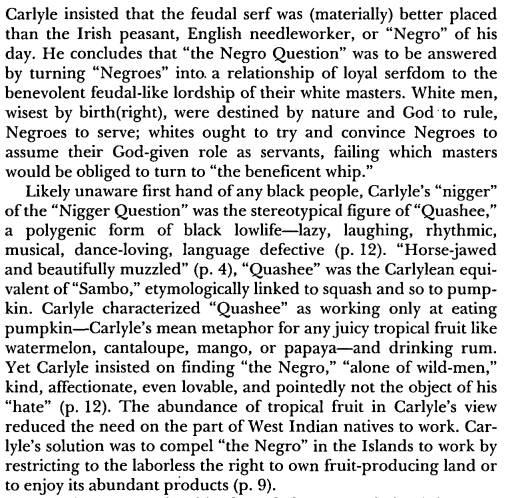
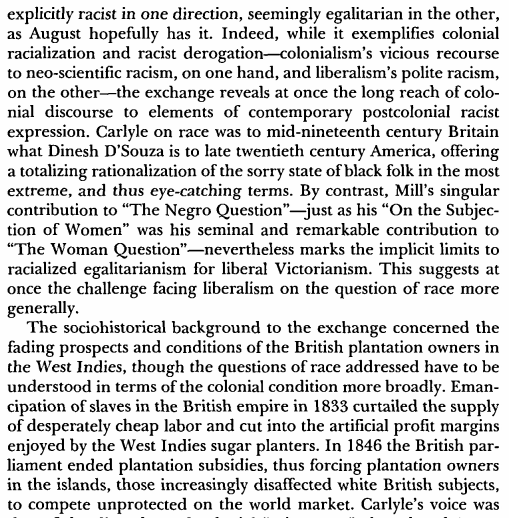
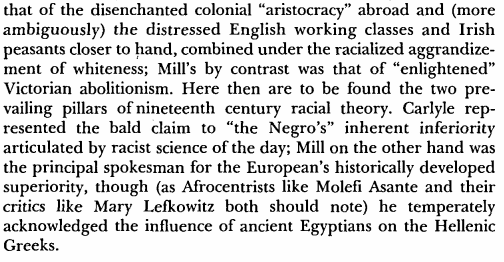
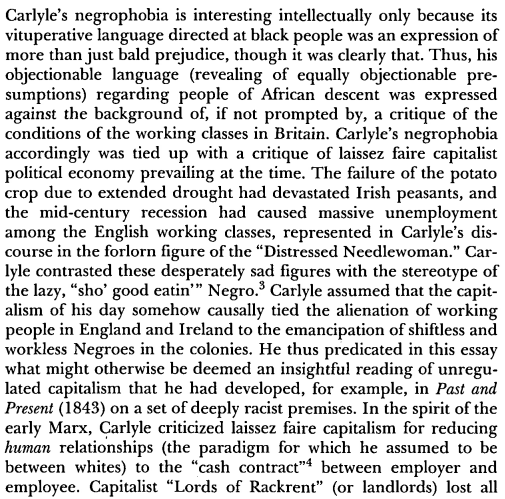
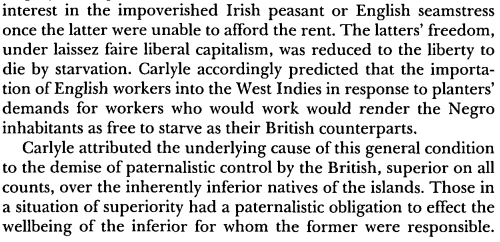

David Theo Goldberg (2000) Liberalism’s limits: Carlyle and Mill on “the negro question”, Nineteenth-Century Contexts: An Interdisciplinary Journal, 22:2, 203-216
So to finish this addendum to the original writing on how I was enthused at political economy as a subject discipline, I see the understanding of economics as necessarily sociological. When it is understood as this the richness of human interconnection becomes fuller and more sensible. I have learned that the study of history too is important in order to understand the context of older writers and what they were saying. As well as this I see the understanding of economics as relying on reintegrating suppressed and uncomfortable historical accounts if we are to advance.
